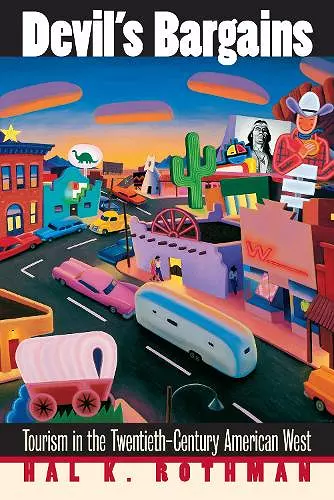Devil's Bargains
Tourism in the Twentieth-Century American West
Format:Hardback
Publisher:University Press of Kansas
Published:31st Oct '98
Should be back in stock very soon

The author's other works include "The Greening of a Nation?: Environmentalism in the US Since 1945", "America's National Monuments: The Politics of Preservation", "On Rims and Ridges: The Los Alamo Area Since 1880" and "Reopening the American West". He is also editor of "Environmental History".
This study looks at the American West, transformed by tourism from a land of opportunity to a land of opportunism. Illuminating the darker side of the industry, this work describes how the costs of tourism have challenged the benefits and proven it to be a devil's bargain.The American West has always been seen as a land of opportunity, but tourism has transformed it into a land of opportunism. From Sun Valley to Santa Fe, towns all over the region have been turned over to outsiders - not just those who visit, but those who control. There's no denying that tourism has been a blessing for many: it's brought economic and cultural prosperity to communities without obvious means of support and allowed towns on the brink of ruin to renew themselves. But in too many cases, the costs of tourism have challenged the benefits and proven it to be a devil's bargain. Environmental historian Hal Rothman examines the impact of tourism on the West in the 20th century to illuminate that industry's darker side. He tells how tourism evolved from Grand Canyon railroad trips to Sun Valley ski weekends to Disneyland vacations, and how the post-World War II boom in air travel and luxury hotels capitalized on Americans' newfound leisure and income. He identifies three dominant forms of tourism - cultural, recreational and entertainment - and shows how they've melded together as the tourism industry has begun to transform everyday places into images of what visitors expect to see. From major destinations like Las Vegas to revitalized towns like Aspen and Moab, Rothman reveals how the initial development of tourism may seem inocuous at first; but residents ultimately realize that control of their communities has been placed in the hands of corporate financiers and that they've lost the very authority they sought to preserve. Because tourism often results in a redistribution of wealth and power, observes Rothman, it represents a new form of colonialism for the region - not East over West, but haves over have-nots. By sharing stories of real places and the experiences of real people that depict the true nature of tourism, Rothman doesn't just document change but enables us to understand why and how it takes place. Balancing historical perspective with an eye for what is now happening in the region, his book aims to set the standard for the study of tourism.
- Winner of Spur Awards (Western Contemp Nonfic) 1999
ISBN: 9780700609109
Dimensions: 235mm x 158mm x 34mm
Weight: 876g
400 pages